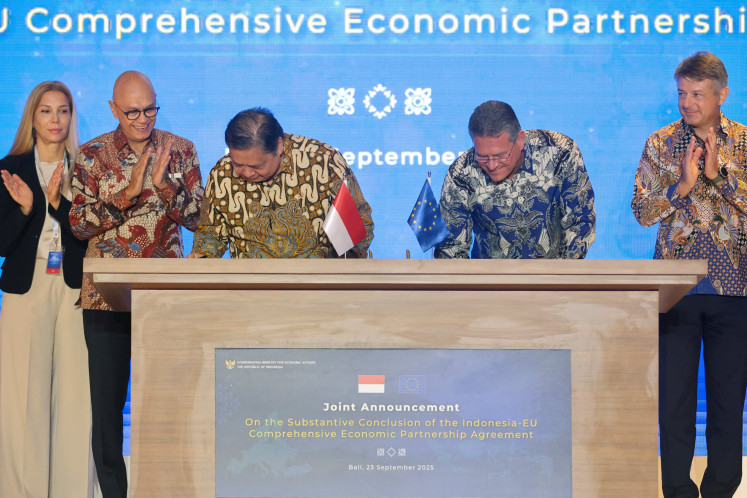Popular Reads
Top Results
Can't find what you're looking for?
View all search resultsPopular Reads
Top Results
Can't find what you're looking for?
View all search resultsBI prepares more hawkish regime
Bank Indonesia (BI) has given a strong signal that the latest bout of monetary tightening may not be the final straw
Change text size
Gift Premium Articles
to Anyone
Bank Indonesia (BI) has given a strong signal that the latest bout of monetary tightening may not be the final straw.
While the central bank already raised its key interest rate by 175 basis points to 7.5 percent this year, BI Governor Agus Martowardojo showed little interest in shifting his policy gears to spur economic growth.
He, instead, said that more measures to stabilize the economy might be needed.
Monetary policies to stabilize the economy still 'need to be prioritized', he said in his address during the Annual Bankers' Dinner on Thursday evening, which was attended by top ministers, local bankers and other banking stakeholders.
'We want to highlight that Bank Indonesia will consistently pursue beneficial policy directions, including during the political transition period in 2014, to maintain stability in the economy and financial market,' he said.
'This stance is in line with structural challenges that might need solutions that are not short-lived.'
Agus presented strong indications that BI, in its policy-making stance going forward, would remain hawkish ' a term coined for a central bank that is more inclined to hike its interest rate to manage stability, rather than keeping the interest rate low to spur economic growth (dovish).
The BI rate would be constantly adjusted to manage inflation and push down current account deficit, he said, without mentioning anything about economic growth.
Agus also expressed little concern over the slowdown in the economy that only grew by 5.6 percent in the third quarter ' its slowest in nearly four years ' which he described as 'inevitable'.
'We deem the correction [in economic growth] as a rebalancing process before the economy could reach a new growth equilibrium that is more in line with its fundamentals,' he said.
On its monetary policy strategy, the central bank would also absorb excess liquidity by issuing the one-year SBI debt papers, as well as the issuance of the medium-term notes. It would also regulate the minimum reserve requirements for Sharia banks, as well as gradually imposing the liquidity coverage ratio (LCR) starting in 2015.
BI was the first central bank in Asia to hike borrowing costs this year as Agus lifted the policy rate from its historic-low level of 5.75 percent, to 7.5 percent ' the highest rate in four years ' in his efforts to stabilize the economy that is grappling with record-high current deficit and towering inflation.
Agus, who was only elected in May this year, also had to deal with the slumping foreign exchange reserves that limited his capacity to support the ailing rupiah, which depreciated 15 percent this year mainly due to severe capital outflows stemming from the prospect of tighter US monetary policy.
However, the fluctuation in the rupiah, if managed carefully, could help shield the country from external shocks, according to the BI governor.
'The currency should move based on its fundamentals, so that it could actually act as a 'shock absorber' for the economy, not as a 'shock amplifier' that triggers volatility,' Agus said, vowing to diversify instruments in the financial market to stabilize the rupiah.
Observers have generally welcomed BI's moves to tighten the economy, citing the fact that BI has focused on propelling growth for too long, a strategy that has led to instability in the economy that has spooked the market.
'We agree on a lot of issues,' Bank CIMB Niaga president director Arwin Rasyid commented on Agus' speech. 'It is very good, very pragmatic and shows that BI is now more market-oriented.'
The central bank's dovish reputation has been the reason behind the underperformance of Indonesian financial assets, according to Tim Condon, an economist with Dutch-based ING Group. 'We see Tuesday's surprise BI policy interest rate hike as beginning to change BI's reputation.'










